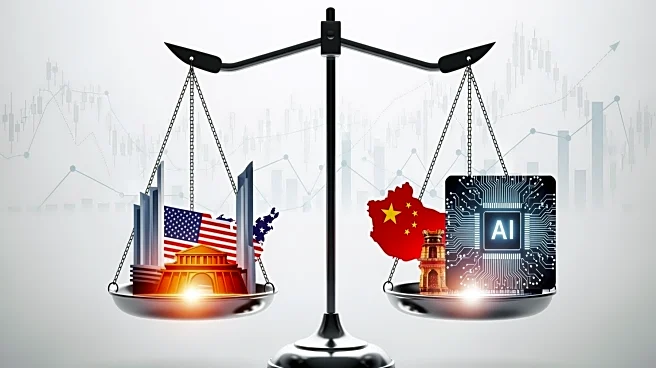What's Happening?
The U.S. stock market experienced minimal changes on Thursday, with the S&P 500 slightly down by 0.1% and the Nasdaq Composite up by 0.2%. This comes amid better-than-expected earnings reports from major
banks and strong revenue forecasts from technology firms. Notably, Nvidia and Broadcom stocks rose following Taiwan Semiconductor's increased revenue guidance and significant profit surge. Salesforce shares also saw a 4% increase after announcing optimistic long-term revenue targets. Despite these gains, the market faces volatility due to ongoing U.S.-China trade tensions, exacerbated by President Trump's recent threats of tariffs and trade bans. The Cboe Volatility Index remains elevated, reflecting investor concerns over trade issues and the ongoing U.S. government shutdown.
Why It's Important?
The current stock market dynamics highlight the significant impact of geopolitical tensions and technological advancements on investor sentiment. The reliance on AI stocks underscores the concentration risk in the market, where a few dominant names drive the rally. This situation poses potential risks if these stocks falter. Additionally, the U.S.-China trade tensions could lead to further economic disruptions, affecting consumer prices and corporate earnings. The government shutdown adds another layer of uncertainty, limiting access to crucial economic data and potentially affecting market stability. Stakeholders, including investors and policymakers, must navigate these complexities to mitigate risks and capitalize on growth opportunities.
What's Next?
As the U.S.-China trade tensions continue, investors will closely monitor any developments or resolutions that could impact market stability. The ongoing government shutdown may prompt political leaders to seek solutions to resume economic data releases, which are vital for informed trading decisions. Additionally, the tech sector's performance will be scrutinized, particularly the sustainability of AI-driven gains. Market participants may adjust their strategies based on these factors, potentially leading to shifts in investment patterns and broader economic implications.
Beyond the Headlines
The current market situation raises ethical and strategic questions about the reliance on a few tech giants to sustain market growth. This concentration risk could lead to increased scrutiny from regulators and calls for diversification in investment portfolios. Furthermore, the geopolitical tensions highlight the need for robust international trade policies that balance national interests with global economic stability. Long-term shifts may include increased focus on domestic production and innovation to reduce dependency on foreign trade.









